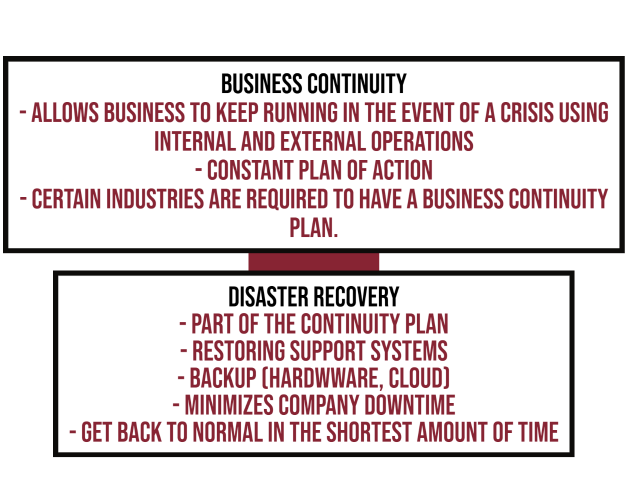What is the difference between business continuity and disaster recovery?
Both business continuity and disaster recovery are involved in preparing a company for the event of a disaster, whether the solution involves prevention or response. Although they fall under the same category, business continuity and disaster recovery have their differences. Therefore, continuous monitoring and use of the SII Cybersecurity Stack is the recommended option by our experts. The SII Cybersecurity Stack follows the NIST Cybersecurity Framework and consists of five functions: Identify, Protect, Detect, Respond, and Recover.
The key difference between business continuity and disaster recovery is when the plan takes effect. Business continuity requires you to keep operations functional during the event of a disaster and immediately after. Disaster recovery is a subset within business continuity — it focuses on how you respond after the event has completed and how you return to normal. See the comparison chart below for more details:

A very simple, but important question: Can your business continue to operate after losing all data and information? No matter the business size or industry, our experience tells us that most businesses struggle to operate and recover after an attack, breach, etc. because their company had not prepared a plan.
Businesses large to small are constantly storing large amounts of information and data. The result of a disaster from hardware failure, hacking, human errors, natural disasters, etc. could cause major damage to a company. Forming a business continuity plan and disaster recovery plan is crucial for protecting this information and data. These types of plans are a relief when a significant disruption happens, they allow a business to continue to operate and stay alive.
Why should you implement these plans?
Each industry has its unique threats, vulnerabilities, and risks that can be specifically targeted by hackers, system failures, etc. This is the ultimate reason why our Cybersecurity Stack is tailored specifically to each client. Some industries fall under guidelines that require a plan for data recovery. For example: Healthcare falls under HIPPA guidelines, which requires the business to implement a business continuity plan for constant data backup and protection. Healthcare information is valued too highly to be manipulated or lost. Constant monitoring and detecting changes are part of the business continuity plan.
If you value your data and information, it is extremely important to have a back-up plan in place. We have seen multiple ransomware attacks recently, along with the usual phishing attempts and worms. Can your company survive a disaster? What backup plans do you have in place? We understand that these questions may be alarming to businesses that have not thought about these issues, but we are here to educate and for support.
Please reach out to marketing@sys-int.com with any questions or to begin your business continuity/disaster recovery plan with Systems Integration.
